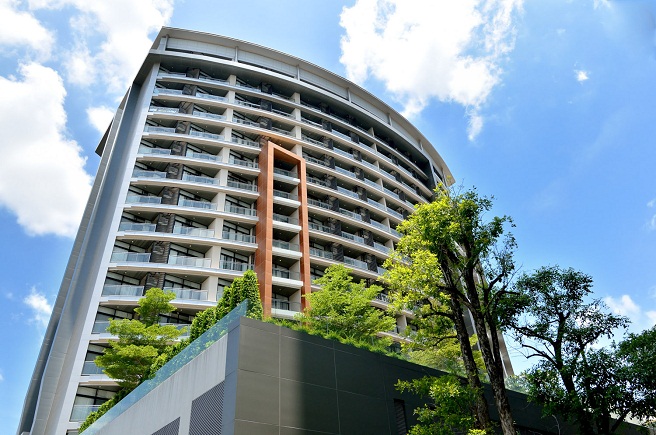A high-end mixed-use residential and hotel, the Aetas in Soi Ruamrudee in the heart of Bangkok, has just been ordered demolished by Thailand’s Supreme Administrative Court.
The Aetas (pictured) consists of a 24-storey hotel and an 18-storey apartment block, which was only recently completed with a construction price tag of approximately B3 billion.
There is no further appeal available to the developers. The order is final.
At issue here was the width of the public road next to the Aetas. For the complex to be built the law required the public road be at least 10 metres wide.
Aetas’s owner argued that it complied with all legal requirements for the construction.
As to the road width, the owner cited a document issued by the Public Works Department, which among other details, gave its opinion that the width of the road next to the Aetas would allow for the construction of the Aetas’s high-rise buildings.
But after residents living nearby filed an administrative court case claiming that the Aetas construction was unlawful, the Public Works Department re-measured the road and found it to be less than the required 10 meters in width.
That meant that anything over seven or eight floors of the Aetas was illegal.
Given the facts of this case that we know, and for purposes of what follows, we will assume that the Aetas’s developer was allowed to build based on the initial measurement by the Public Works Department, which satisfied the legal requirements of public road width.
Why would the Supreme Administrative Court order an existing building to be demolished even though the developer believed it had – and indeed may have – obtained a legitimate building permit?
Such questions are particularly relevant for villa and other structure owners in Phuket where, for example, there are rampant examples of violations of the 80-metre elevation law and laws on proximity to the sea.
To answer we must first understand the legal status of a building permit in Thailand.
From a legal perspective, a building permit is an “administrative order”. This is defined in Section 5(1) of the Administrative Procedures Act, 1996 (APA) as follows:
An exercising of powers under the law by the competent officers with an effect of creating legal relations between persons in such a way to create, change, transfer, reserve, suspend, or which renders an effect to the status of rights or duties of a person, whether it be permanent or temporary, such as, ordering, permission, approval, decision of appeal, certification, and acceptance of registration, but excluding an issuance of rules.
The relevant law that provides for the issue of a building permit administrative order is the 1979 Building Control Act (BCA). And if you want to build, modify or move a structure in Thailand you need this administrative order under the BCA, a building permit.
The process for issuing such a permit includes review of relevant laws to determine if the contemplated building is legally permissible.
In certain areas of Thailand, such as Phuket, the land use is primarily regulated by three laws: the BCA; the 1975 City Planning Act; and the National Environmental Control and Maintenance Act of 1992.
If all the documents are in order and the building is legally permissible, the local administrative office must issue a building permit.
As long as the building permit is in effect, the applicant has the right to construct the building as permitted. Section 42 of the APA makes this clear: “An administrative order shall be valid so long as it is not revoked or terminated by time condition…”.
Revoked? Can a building permit be revoked after its issue and before its expiration?
Yes, it can. Legally speaking, a building permit is merely an administrative order and these can be revoked by government administrative measures or court action.
A relevant and interested party – in other words, any third party affected by the administrative order, such as a neighbour of a development that received a building permit, can initiate a revocation.
If the relevant government office or court agrees that there is a factual or legal problem with that permit, the permit may be revoked or amended.
Building permit applicants and holders should take careful note that the relevant government office does not need to wait for the court to have a say. Section 49 of the APA states:
The competent officer or the supervisor of the competent officer may revoke an administrative order according to the bases in Section 51, Section 52 and Section 53, whether or not it has passed the steps of appeal or protest under this law or other laws.
The conditions for revoking an administrative order (without appeal) are strict and if revoked the consequences of such revocation depend on whether or not the original order was lawful or unlawful.
The revocation of a lawful administrative order/permit is subject to compensation by the government for damages, whereas the revocation of an unlawful administrative order is subject to compensation only if the recipient of the administrative order/permit was not aware of the unlawfulness.
Section 51 of the APA clearly defines an unlawful administrative order:
1. The said person has produced false statements or has concealed facts which should have been reported, or has made a threat or a persuasion by offering property or providing any other benefits illegitimately; or
2. The said person has produced statements which are incorrect or incomplete in the material part thereof; or
3. The said person has known of the unlawfulness of the administrative order at the time of receiving administrative order, or his/her not knowing of such is due to his/her serious negligence.
Thus, an illegal building permit obtained through corruption, for example, can be revoked with no compensation.
So, once a building permit is received, that alone is no guarantee that the applicant will be able to finish the project.
A building permit can expire, be revoked after a court appeal, or be revoked by the relevant administrative government itself.
To avoid the harsh consequences of a building permit revocation, it is strongly advised that the developer perform a competent and comprehensive due diligence into the legality of the project prior to applying for the permit, and be certain that the project complies with law, regardless of the permit.
No doubt the Aetas owners now wish they had.
Duensing Kippen is an international law firm specializing in business transaction and dispute resolution matters, with offices in Bangkok and Phuket, Thailand and over 100 affiliated offices in more than 50 other countries. Visit them at: duensingkippen.com
This story was first published by The Phuket News and is published as part of an editorial partnership between The Phuket News and PropertyGuru Group.



